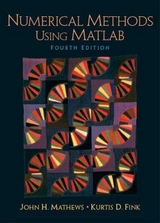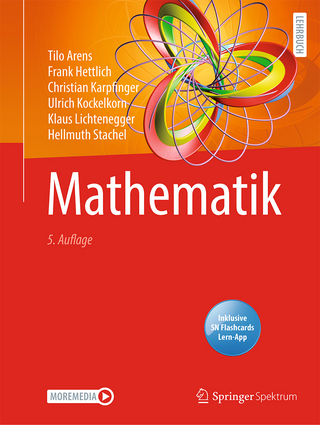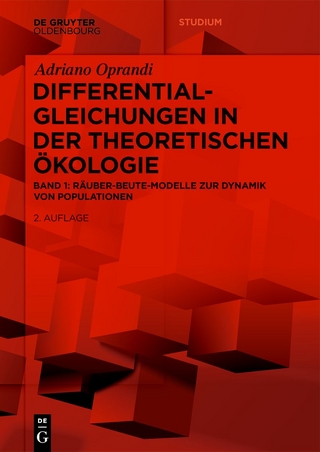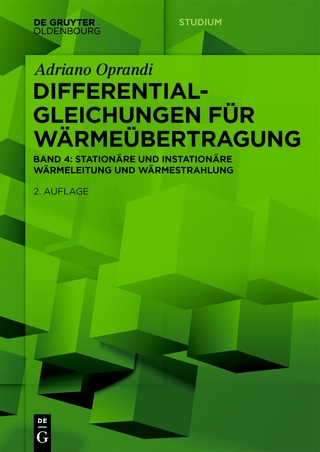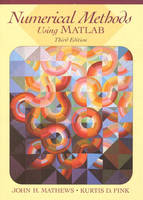
Numerical Methods Using MATLAB
Seiten
1999
|
3rd edition
Pearson (Verlag)
978-0-13-270042-9 (ISBN)
Pearson (Verlag)
978-0-13-270042-9 (ISBN)
- Titel erscheint in neuer Auflage
- Artikel merken
Zu diesem Artikel existiert eine Nachauflage
This text provides an introduction to numerical analysis for either a single term course or a year long sequence.
It is suitable for undergraduate students in mathematics, science, and engineering. Ample material is presented so that instructors will be able to select topics appropriate to their needs.
This text provides an introduction to numerical analysis for either a single term course or a year long sequence. It is suitable for undergraduate students in mathematics, science, and engineering. Ample material is presented so that instructors will be able to select topics appropriate to their needs. *NEW-Replaces all pseudo-code algorithms with MATLAB programs, taking advantage of MATLABs widespread accessibility for educational instruction. *MATLABs structured programming style is easy for students to learn and resembles FORTRAN. *MATLAB allows for simple modification and in the exercises, students are encouraged to explore and compare modifications of algorithms. *Built-in MATLAB commands facilitate the plotting of numerical results from interpolation, curve fitting, differential equations, etc., thereby developing an important graphical understanding of problems and an invaluable sense of realism and enjoyment in numerical mathematics. *Provides a variety of examples and problems to develop and sharpen students skills in both the theory and practice of numerical analysis, includes easy-to-read proofs and worked-out examples.
*Presents a wealth of tables and graphs to illustrate computer calculations in examples making the resulting numerical approximations easier to interpret. *Emphasizes why numerical methods work and their limitations, balances theory, error analysis, and readability, presents an error analysis for each method with an approach that is appropriate for the method at hand, but does not intimidate students, gives a mathematical derivation for each method that uses elementary results and builds students understanding of numerical analysis. *Offers computer assignments implementing the algorithms to give students an opportunity to practice their skills at scientific programming. *Details algorithms in pseudo-code. *Focuses on practical algorithms involving curve fitting, function approximations, numerical integration, linear systems solution, etc.
It is suitable for undergraduate students in mathematics, science, and engineering. Ample material is presented so that instructors will be able to select topics appropriate to their needs.
This text provides an introduction to numerical analysis for either a single term course or a year long sequence. It is suitable for undergraduate students in mathematics, science, and engineering. Ample material is presented so that instructors will be able to select topics appropriate to their needs. *NEW-Replaces all pseudo-code algorithms with MATLAB programs, taking advantage of MATLABs widespread accessibility for educational instruction. *MATLABs structured programming style is easy for students to learn and resembles FORTRAN. *MATLAB allows for simple modification and in the exercises, students are encouraged to explore and compare modifications of algorithms. *Built-in MATLAB commands facilitate the plotting of numerical results from interpolation, curve fitting, differential equations, etc., thereby developing an important graphical understanding of problems and an invaluable sense of realism and enjoyment in numerical mathematics. *Provides a variety of examples and problems to develop and sharpen students skills in both the theory and practice of numerical analysis, includes easy-to-read proofs and worked-out examples.
*Presents a wealth of tables and graphs to illustrate computer calculations in examples making the resulting numerical approximations easier to interpret. *Emphasizes why numerical methods work and their limitations, balances theory, error analysis, and readability, presents an error analysis for each method with an approach that is appropriate for the method at hand, but does not intimidate students, gives a mathematical derivation for each method that uses elementary results and builds students understanding of numerical analysis. *Offers computer assignments implementing the algorithms to give students an opportunity to practice their skills at scientific programming. *Details algorithms in pseudo-code. *Focuses on practical algorithms involving curve fitting, function approximations, numerical integration, linear systems solution, etc.
1. Preliminaries.
2. The Solution of Nonlinear Equations.
3. The Solution of Linear Systems.
4. Interpolation and Polynomial Approximation.
5. Curve Fitting.
6. Numerical Differentiation.
7. Numerical Integration.
8. Numerical Optimization.
9. Solution of Differential Equations.
10. Solution of Partial Differential Equations.
11. Eigenvalues and Eigenvectors.
Appendix: An Introduction to MATLAB.
Suggested References.
Bibliography and References.
Answers to Selected Exercises.
Index.
| Erscheint lt. Verlag | 8.1.1999 |
|---|---|
| Sprache | englisch |
| Maße | 183 x 243 mm |
| Gewicht | 1100 g |
| Themenwelt | Mathematik / Informatik ► Mathematik ► Analysis |
| ISBN-10 | 0-13-270042-5 / 0132700425 |
| ISBN-13 | 978-0-13-270042-9 / 9780132700429 |
| Zustand | Neuware |
| Informationen gemäß Produktsicherheitsverordnung (GPSR) | |
| Haben Sie eine Frage zum Produkt? |
Mehr entdecken
aus dem Bereich
aus dem Bereich
Buch | Softcover (2024)
De Gruyter Oldenbourg (Verlag)
59,95 €
Buch | Softcover (2024)
De Gruyter Oldenbourg (Verlag)
59,95 €
